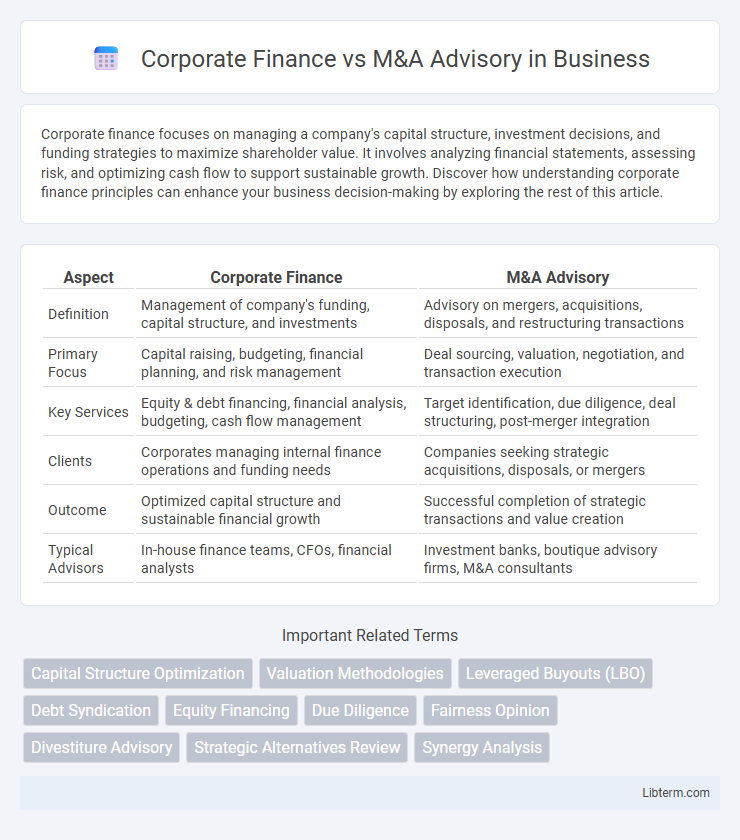Corporate finance focuses on managing a company's capital structure, investment decisions, and funding strategies to maximize shareholder value. It involves analyzing financial statements, assessing risk, and optimizing cash flow to support sustainable growth. Discover how understanding corporate finance principles can enhance your business decision-making by exploring the rest of this article.
Table of Comparison
| Aspect | Corporate Finance | M&A Advisory |
|---|---|---|
| Definition | Management of company's funding, capital structure, and investments | Advisory on mergers, acquisitions, disposals, and restructuring transactions |
| Primary Focus | Capital raising, budgeting, financial planning, and risk management | Deal sourcing, valuation, negotiation, and transaction execution |
| Key Services | Equity & debt financing, financial analysis, budgeting, cash flow management | Target identification, due diligence, deal structuring, post-merger integration |
| Clients | Corporates managing internal finance operations and funding needs | Companies seeking strategic acquisitions, disposals, or mergers |
| Outcome | Optimized capital structure and sustainable financial growth | Successful completion of strategic transactions and value creation |
| Typical Advisors | In-house finance teams, CFOs, financial analysts | Investment banks, boutique advisory firms, M&A consultants |
Introduction to Corporate Finance and M&A Advisory
Corporate finance centers on managing a company's financial activities, including capital structure decisions, budgeting, and investment analysis to maximize shareholder value. M&A advisory specializes in guiding organizations through mergers, acquisitions, and divestitures, focusing on deal valuation, negotiation, and integration strategies. Both fields require deep financial expertise but differ in scope, with corporate finance emphasizing ongoing financial management and M&A advisory concentrating on transactional processes.
Defining Corporate Finance: Scope and Functions
Corporate Finance encompasses managing a company's capital structure, funding strategies, and investment decisions to maximize shareholder value through activities like budgeting, forecasting, and risk management. It involves optimizing short-term and long-term financial planning, including working capital management, capital raising, and dividend policies. The primary function of Corporate Finance is to ensure efficient allocation of financial resources, aligning financing with strategic business objectives and operational goals.
What is M&A Advisory? Core Roles and Services
M&A advisory involves providing expert guidance on mergers, acquisitions, and corporate restructuring to help companies grow or divest strategically. Core roles include target identification, valuation analysis, negotiation support, and deal structuring to optimize transaction value. Key services encompass due diligence coordination, financial modeling, regulatory compliance, and integration planning to ensure smooth deal execution and maximize shareholder value.
Key Differences Between Corporate Finance and M&A Advisory
Corporate finance primarily concentrates on managing a company's capital structure, fundraising, and financial planning to maximize shareholder value, while M&A advisory focuses on providing strategic guidance for mergers, acquisitions, and divestitures. Corporate finance professionals analyze financial statements, manage budgeting, and optimize capital allocation, whereas M&A advisors conduct due diligence, valuation, negotiation, and integration planning for transactional deals. The risk profiles differ as corporate finance involves ongoing financial management, contrasting with the deal-specific, transactional nature of M&A advisory services.
Types of Clients Served in Corporate Finance vs M&A Advisory
Corporate finance primarily serves a diverse range of clients including large corporations, small and medium-sized enterprises (SMEs), and financial institutions seeking capital structure optimization, funding solutions, and risk management strategies. M&A advisory focuses on clients involved in mergers, acquisitions, and divestitures, typically including private equity firms, corporate buyers, and sellers aiming to maximize transaction value and strategic fit. Both sectors tailor their services based on client size and objectives, but corporate finance maintains a broader client base with ongoing financial management needs compared to the transaction-specific focus of M&A advisory.
Strategic Objectives: Value Creation and Growth
Corporate finance focuses on optimizing capital structure, managing financial risks, and funding strategies to drive long-term value creation and sustainable growth within a company's operations. M&A advisory specializes in identifying strategic acquisition targets, conducting due diligence, and negotiating deals that accelerate market expansion and enhance competitive positioning. Both disciplines align objectives toward maximizing shareholder value through efficient resource allocation and strategic growth initiatives.
Typical Deal Structures and Transactions
Corporate finance primarily involves capital raising through equity, debt, and hybrid instruments, focusing on structured transactions like initial public offerings (IPOs), bond issuances, and private placements to optimize company valuation and liquidity. M&A advisory specializes in orchestrating mergers, acquisitions, divestitures, and leveraged buyouts, often structuring deals with earn-outs, stock swaps, or asset purchases to align buyer-seller interests and facilitate smooth ownership transfers. Both domains emphasize tailored deal structuring to maximize financial outcomes, but corporate finance leans on financing mechanisms while M&A advisory centers on transaction negotiation and strategic fit.
Required Skills and Qualifications for Each Field
Corporate finance professionals require strong analytical skills, proficiency in financial modeling, and a deep understanding of capital markets, accounting principles, and regulatory compliance. M&A advisory experts must excel in negotiation, due diligence, valuation techniques, and strategic thinking to successfully manage mergers, acquisitions, and divestitures. Both fields demand excellent communication skills, attention to detail, and the ability to work under pressure, with certifications such as CFA, CPA, or relevant financial licenses enhancing career prospects.
Career Paths and Opportunities: Corporate Finance vs M&A Advisory
Corporate finance careers emphasize financial planning, capital structure management, and budgeting within corporations, often leading to roles such as financial analyst, treasurer, or CFO. M&A advisory focuses on transaction execution, deal structuring, and valuation, providing opportunities to work as an investment banker, deal advisor, or corporate development professional. Both fields offer high earning potential and require strong analytical skills, but M&A advisory typically involves intense deal flow and client interaction, while corporate finance emphasizes strategic financial management and long-term business planning.
Choosing the Right Advisory: Factors to Consider
Choosing the right advisory between Corporate Finance and M&A Advisory depends on your company's strategic goals and transaction complexity. Corporate Finance advisory focuses on capital structure optimization, raising funds, and financial planning, ideal for growth or restructuring phases. M&A Advisory specializes in deal execution, valuation, and negotiation support, best suited for mergers, acquisitions, or divestitures requiring industry-specific expertise and regulatory knowledge.
Corporate Finance Infographic

 libterm.com
libterm.com